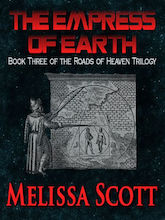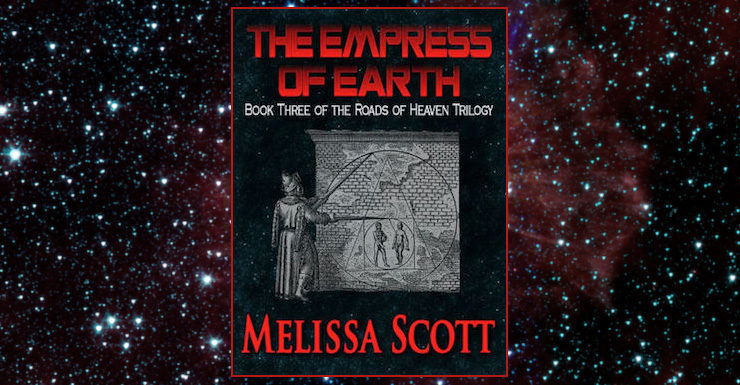In this instalment of the QUILTBAG+ SFF Classics series, we reach the final volume of Melissa Scott’s science-fantasy trilogy The Roads of Heaven: The Empress of Earth. As I mentioned in the previous two reviews (Five-Twelfths of Heaven and Silence in Solitude), this book exists in two considerably different variants, because the author extensively revised it 26 years after its original publication.
For this column, I have read both versions in order to compare them. If you are confused which version you have, an easy way to tell them apart without any spoilers is to search the ebook for the string “Ciel”—this minor character only exists in the newer release. If you have a print book, you have the original text. (I am very grateful to the author, who helped me sort out the versions after I mistakenly purchased two copies of the old version, instead of one of each.)
As foreshadowed by the title, in The Empress of Earth, the mage and starship pilot Silence Leigh and her two husbands finally reach the mythical, long-lost planet Earth. They are caught up in political intrigue from the outset: their attempt to find Earth is sponsored by a leader who has recently come to power and wants to make sure his children inherit his position. I will try to talk about the book without giving away plot points, but I do have to describe some of the setting to explain why it appealed to me.
We readers get treated to both Scott’s now-familiar, but still highly unique blend of magic, music, and spaceflight… and also to something radically different from the first two books. Earth, purposefully isolated from other technological civilizations by a political entity known as the Rose Worlds, has developed by and large without magic. People still use combustion engines, computers, and all the devices that we can imagine as part of a modern world. As I mentioned in previous reviews, magic and mechanical technology are at odds with each other in this continuity, because the machines’ vibrations interfere with the music-based alchemical magic. So here we get to see two worlds collide: the unique science-fantasy setting that has been established over two lengthy novels and which, at this point, requires very little suspension of disbelief from readers, and a world that is a straightforward extrapolation of our own reality into the future. This premise produces the most splendid defamiliarization. Our characters stumble through the motions of taking public transportation, find themselves entirely perplexed by credit cards and intimidated by computers, but find out that smuggling works similarly all across the universe. Sometimes the differences are hilarious—I laughed out loud when, in the new version of the novel, Silence was painstakingly trying to describe what seemed to me like a MIDI keyboard. But sometimes these differences are profoundly thought-provoking. At one point, I realized that Melissa Scott has built up a universe where it not only makes perfect sense for an engineer to be terrified of machines, but has also been so thorough and successful in her worldbuilding that my reaction as a reader was “But of course!” …before I stopped myself and just stared at the page, asking “Wait, what?!”
I enjoyed both versions of the book, but overall preferred the revision over the original. The voyage to Earth is roughly similar—only the events on Earth are different. Some characters who originally chose to stay with the spaceship now join the adventures, and the book is all the stronger for it, while keeping all my favorite scenes from the original largely intact. The general political context is also much better explained, and the “Empress” theme is worked much more thoroughly into the narrative. There is also more magic—one of the big selling points of the series to begin with—and there are more explicit explorations of how symbols work both in magic and in politics. Another small, but to me important change is that we’re given greater context for the Rose Worlds’ reason to keep Earth isolated, both in a mundane and a magical sense.
The characterization is also stronger in the new edition. There was a moment that really jarred me in the original version in which Silence used her magic to kill people who were attacking her, and I felt that she was dishing out murder in an all-too-casual manner. This scene goes very differently in the new version, and the changes solve all my issues with the earlier version. Scott even lampshades the previous narrative slightly: another character later points out to those characters that Silence could easily have killed them.
Buy the Book


The Empress of Earth
I hope it doesn’t count as a spoiler to note that this is also emphatically not a queer tragedy book. The characters stay together in their polyamorous triad. The new version features slightly more physical intimacy between the characters, which I appreciated seeing—but I was also glad that it didn’t veer off the tracks of the main plot in order to add more. I really liked that this series features a happy triad, but also showed that it’s completely normal at the end of a very exhausting day to just collapse into a bed for three and sleep. I enjoyed the fact that the two men are also depicted as being attracted to each other. While this is not necessarily a given and all sorts of configurations are possible in polyamory, it does show both same- and other-gender relationships within this particular triad. (Silence herself seems heterosexual: there is a scene in which she faces apparitions of people she has been attracted to, and they are all men.) Silence very much centers the narrative on herself and remains a very forceful personality, but in this volume—especially in the newer version—the men in this relationship have more room to develop than previously, which makes the eventual outcomes all the more poignant.
The new version also offers lengthier appearances by Princess Aili, who instead of trying to remove herself from the narrative due to reasons of traditional modesty, instead plans a workaround and ends up both covering her face and hiding the fact that she is covering her face, using magic. I cover only my head and do not particularly hide it, but solutions like this definitely exist in my communities, though they do not rely on magic—so that was nice to see. It worked for me both in terms of being recognizable as a solution that some people would choose and other people would decry, and it was consistent in-universe, as well. I had been troubled by some aspects of the previous volume where I felt that the specific details evoked the Ottoman empire too closely; but here, that kind of thematic thread is entirely missing, and the book works all the better for it. I especially enjoyed seeing how some people on Earth who’d had contact with other planets are influenced by off-world cultures, and choose to cover to some degree as a fashion statement. This aspect of the novel doesn’t have an immediate present-day parallel with uncomfortable implications (the power balance is tilted the opposite way than it would be in the case of cultural appropriation), and it fits well into the novels’ setting.
The trilogy leaves plenty of room for a sequel or prequel, and the author has said that she’s been thinking about more stories on and off for years. I, for one, would love to see more work set in this continuity, and I hope my reviews have encouraged you to check out these books in the meantime.
Next time we will continue with a book by a different author that won the Carl Brandon Award and was shortlisted for the Tiptree and PKD Awards back when it came out, and yet is quite underdiscussed today… For now, you can also read Liz Bourke’s reviews of more Melissa Scott books here on Tor.com, and keep an eye out: I might also cover more of Scott’s work in the future!
Bogi Takács is a Hungarian Jewish agender trans person (e/em/eir/emself or singular they pronouns) currently living in the US with eir family and a congregation of books. Bogi writes, reviews and edits speculative fiction, and is currently a finalist for the Hugo, Lambda and Locus awards. You can find em at Bogi Reads the World, and on Twitter and Patreon as @bogiperson.










